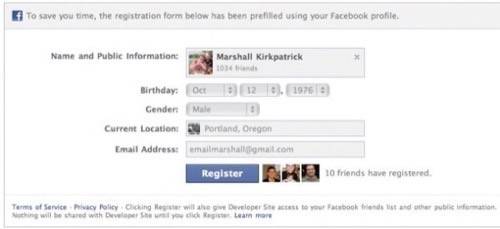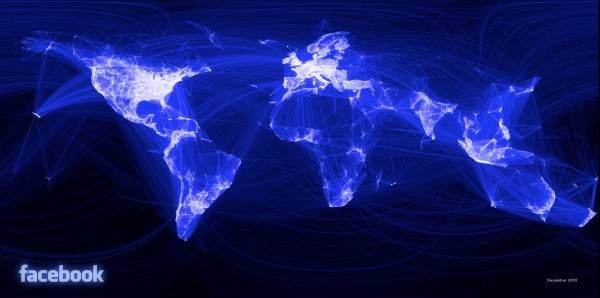Facebook today unveiled an incredibly simple new service that will allow any website owner to hand over user registration for their site to Facebook, undoubtedly something countless independent sites have considered since seeing the disaster that resulted from the hacking of Gawker’s user account info earlier this month.

The new tool, called simply Registration Tool, is both simpler and more powerful than Facebook Connect. It works as a pre-populated iFrame for logged-in Facebook users, allows site owners to ask for fields of information not offered by Facebook and can be used to register people who do not have Facebook accounts. All under the watchful eye of Facebook, a company that leads the world in online identity and specializes in user data security. It’s a very smart move, but raises questions about the company’s growing power.
Web development thought leader Jeff Atwood articulated what’s becoming an increasingly common sentiment in a recent blog post called The Dirty Truth About Web Passwords:
I’m not here to criticize Gawker. On the contrary, I’d like to thank them for illustrating in broad, bold relief the dirty truth about website passwords: we’re all better off without them. If you’d like to see a future web free of Gawker style password compromises — stop trusting every random internet site with a unique username and password! Demand that they allow you to use your internet driver’s license — that is, your existing Twitter, Facebook, Google, or OpenID credentials — to log into their website.
That’s exactly what the new Facebook Registration tool will make it easy for websites to do. In some cases, with a single line of code.

More Data for Facebook
Facebook is gobbling up user data left and right, that’s the price for the power, convenience and security the company’s identity services offer. Facebook said earlier this month that ten thousand sites are adding Facebook Connect every day. Peter Kafka reports today at All Things D that Facebook execs at the highest levels are out visiting major media companies like Time Warner and Verizon, trying to convince them to institute Facebook as the user registration and login system across their properties, too.
This new service will undoubtedly make Facebook the defacto registration service for countless more websites. Even people who don’t have Facebook accounts will be able to register for websites using this tool – and perform that registration through Facebook.
What does all this mean? It almost feels futile to argue against the growth of Facebook as identity provider across the web. The company is just so good at powering this important feature. Individual websites don’t want to mess around with it.
But with great power, comes great responsibility. Right? Facebook is already the world’s greatest living census, filled with data about our lives, interests, social connections and activities. Imagine that data being made available for analysis – what an incredible opportunity for social self-awareness it would provide. Imagine that data cross-referenced with other data sets; each new permutation might shed new light on an opportunity for economic growth, on a social injustice that needs to be remedied or on something simply good for us to know about ourselves.
I’ve been calling for that to happen for years – right up to the point of a one on one conversation about the importance of aggregate user data analysis with Mark Zuckerberg at Facebook headquarters.
My favorite example of how aggregate data can change the world: it was when US census data and bank mortgage loan data were first made available for computer analysis that a historical pattern of discriminatory lending keeping families of color out of key neighborhoods in major US cities was discovered. Real estate red-lining, as it is called, was illuminated by aggregate data analysis. Comparable issues are sure to be hidden in the huge trove of data about how we live our lives on Facebook.
Now more voices are calling for the same thing. In this month alone so far, writers at Slate, The Atlantic and Forbes all called on Facebook to open up its data to outside researchers.

Cliff Kuang, designer and contributor to Fast Company, Wired and more, wrote yesterday about Facebook’s new graph of user friend connections around the world and year-end list of trending topics:
“But what really boggles the mind is why Facebook isn’t doing more work like this with its data, or least letting a select few use it — the company possesses the greatest catalog of human life ever created. It’s no wonder that social scientists dream of getting just a fraction of that data, to study everything from how social connections are related to job markets, to disease transmission across city borders. After all, Facebook users are the ones who’ve provided this data. Shouldn’t we be getting more out of it than the Top Status Trends of the Year?”
Web 2.0 grandaddy Tim O’Reilly agreed on Twitter, saying, “He’s right. Facebook should do more with this data.”
Facebook should do more with this data, especially if it’s going to insist on gobbling up more and more of it all over the web. That’s the least it could do to share some of the wealth, our data wealth, that it’s compiling. Otherwise it will be hard to think of the company as something other than a big hungry monster.

















